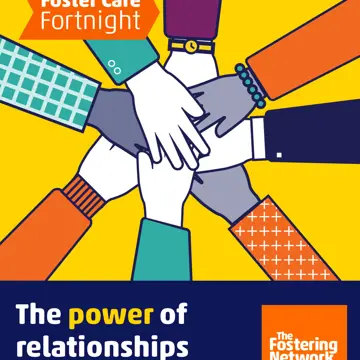Since December, we’ve been campaigning to influence the Children's Wellbeing and Schools Bill in the UK Parliament, a Government bill which was introduced to change the law on a range of issues affecting children in England.
We are pleased the bill brings about some long awaited and much needed changes to children’s social care. Its focus on early intervention, tackling profiteering in the sector, and kinship care, is a welcome step towards addressing key issues within children’s social care.
However, we are disappointed that the bill had a distinct lack of focus on foster care and does not bring forward key commitments from the Independent Review into Children’s Social Care and the previous government’s strategy ‘Stable Homes, Built on Love’. We think that it needs to go further to improve support for foster carers, and for children and young people in foster care.
So far, we’ve had some real success with our calls for change around the bill.
What have we achieved so far?
Second reading
Before the bill’s second reading in the House of Commons in January, we put together our briefing, which looked at what the bill covers, and set out where we think it could do more to address the key issues facing foster carers and children and young people in foster care.
Committee stage
At the committee stage, where MPs look in detail at the bill, we were pleased to work with Ellie Chowns, a Green Party MP, on two amendments. An amendment is a change to the wording of a bill, which is suggested by an MP or a member of the House of Lords.
Delegated authority
The first amendment suggested changing the bill so that it would give default authority to foster carers, so they can make day-to-day decisions for the children and young people in their care - as committed to by the previous Government.
We were really pleased that the minister backed the amendment, and that she agreed to add it into regulations, after a full consultation with foster carers and birth parents. This is a really important step in ensuring foster carers are more respected by children’s services and have more freedom to make better day-to-day decisions about the children in their care, who they know best.
As one foster carer in our recent State of the Nations 2024 survey said:
“Everything has to be run by my social worker first, who then has to discuss with child's social worker, then has to be discussed with managers and then time for them to implement the action depending on their diary availability.”
Staying Put extension
Our second amendment, which was also put forward by Ellie Chowns MP, and supported by Munira Wilson (Lib Dem MP and lead spokesperson for children), aimed to extend Staying Put provision to age 25. Staying Put provision allows young people to stay with their former foster carers up until the age of 21. Currently, the bill extends Staying Close provision, which allows young people to stay in residential care, but not Staying Put which would allow them to stay in foster care. This which risks creating a two-tier system for young people who wish to stay with their former foster carers
We know many young people and foster carers would like the young people they are fostering to stay with them past 21 but cannot because there is currently no funding to support it. We also know that foster care and a family home has the best long-term outcomes for young people transitioning into adulthood.
As one foster carer in our recent State of the Nations 2024 survey said:
“The increase in the age for staying put would be of amazing benefit to care leavers. At the age of 21 many who have had the opportunity to go to university are just obtaining their qualification and have to face negotiating the next huge step, the job market, and to find that they are possibly homeless due to leaving their placement is a catastrophic step backwards.”
Unfortunately, the Government didn’t accept the amendment. They stated that they recognise the case that was made, but need to prioritise young people in residential care, who often have the most complex needs. However, children in foster care also have complex needs. Many children are placed in residential care simply because there aren’t enough available foster placements, not because their needs are fundamentally different.
We will continue to push for this amendment in the next stages of the bill so young people can have the same opportunities regardless of whether they are in residential or foster care.
What's next?
The bill has now passed into the House of Lords and will have its second reading in the House of Lords on 1st May. We are reaching out to peers to table more amendments, to make sure the bill addresses what really matters to foster carers and children and young people in foster care.
We will be asking peers to work with us, to suggest changes to the bill on the following areas:
-
Extending Staying Put provision to age 25
-
Improving the consistency of allowances and fees for foster carers
-
Developing a local offer for foster carers
-
Developing a register for foster carers
-
Developing a training framework for foster carers

